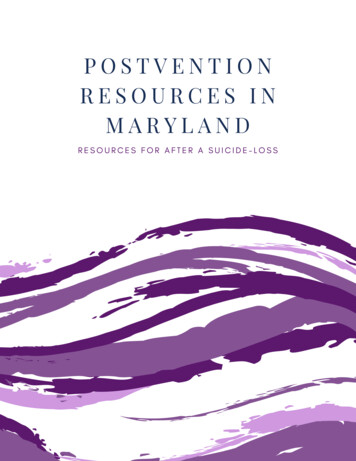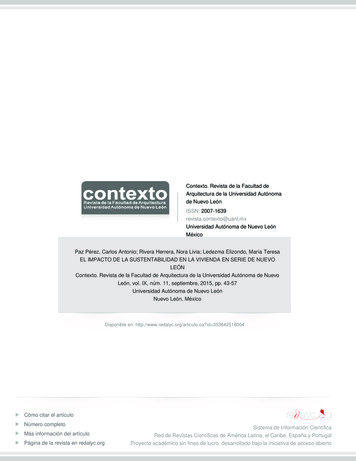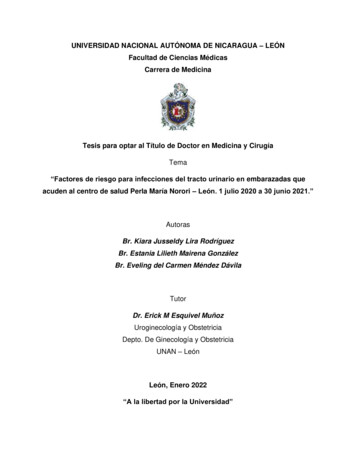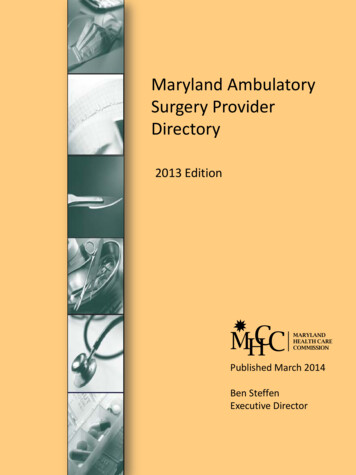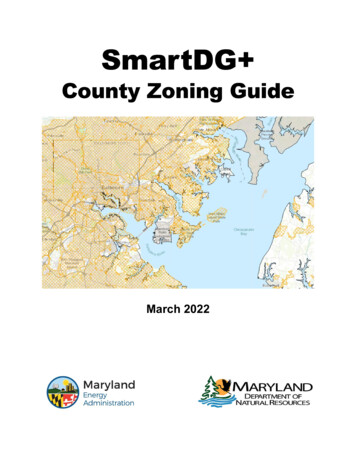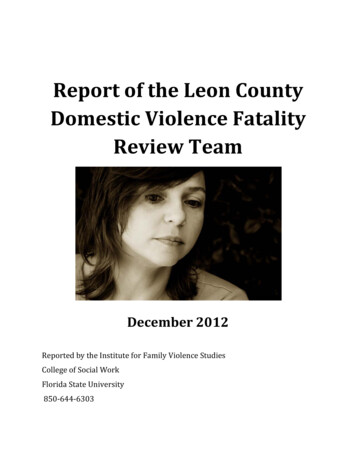
Transcription
Report of the Leon CountyDomestic Violence FatalityReview TeamDecember 2012Reported by the Institute for Family Violence StudiesCollege of Social WorkFlorida State University850‐644‐6303
Page 2IntroductionThe Leon County Domestic Violence Fatality Review Team (Leon Team) reviews deathsassociated with domestic violence in order to improve coordination and delivery ofservices to prevent incidents of domestic violence and deaths resulting from domesticviolence. Formed in late 2011, the Leon Team is currently coordinated by the Institute forFamily Violence Studies (IFVS) at Florida State University’s College of Social Work. Themembers all serve in a voluntary, uncompensated capacity. This Report is the Leon Team’sfirst Annual Report.BackgroundIn 2011, there were five domestic violence fatalities in Leon County, a striking increasefrom prior years noted and emphasized by the local newspaper, the Tallahassee Democrat,and reporter Jennifer Portman. Over the course of several months, Portman wrote a seriesof in‐depth articles about those local domestic violence fatalities. In many ways, Portman’sdetailed articles served as a roadmap for a new Team: her meticulous examination ofparticular homicides raised public awareness, highlighted the absence of a review team inFlorida’s Capital, and demonstrated how much information could be gleaned from thestudy of individual cases. With Editor Bob Gabordi, Portman subsequently assembled agroup of community members in a boardroom at the newspaper’s office in November 2011to discuss forming a fatality review team to seek ways to reduce this crime.The resulting Leon County Domestic Violence Fatality Review Team was formed pursuantto Section 741.316 of the Florida Statutes. Under 741.316, a “domestic violence fatalityreview team” may include, but is not limited to, representatives of law enforcementagencies, the state attorney, the medical examiner, domestic violence centers, childprotection service providers, the office of court administration, the clerk of court, victimservices programs, child death review teams, members in the business community,probation or corrections agencies, or other persons with knowledge regarding domesticviolence fatalities, nonlethal incidents of domestic violence, or suicides, including research,policy, law, and other matters connected with fatal incidents.Twenty‐four states, including Florida, currently have active statewide domestic violencefatality review teams. In Florida, there are 14 fatality review teams, with two teams madeup of more than one county: Alachua, Brevard, Broward, Duval, Hillsborough, Miami‐Dade,Palm Beach, Pasco, Pinellas, Polk/Highlands, Santa Rosa, Sarasota/Manatee, Seminole, andSt. Johns counties. Team practices from these counties’ review teams were taken intoaccount when forming the Leon County Team and developing the procedures for itsoperation.Leon County Domestic Violence Fatality Review Team Report 2012
Page 3Fatality review teams review fatal and near‐fatal incidents involving domestic violence andsuicides. The reviews include a history of events leading up to the domestic violencefatality, a survey of available resources in the community, laws, policies and proceduresaffecting domestic violence prevention and response, and other information or actions thatwere deemed relevant, including a review of public records. Throughout 2012, The LeonTeam also reviewed state and local statistics on domestic and dating violence, as well asother crime data.The Team’s coordinators at the IFVS conducted research on other fatality review teams inthe state and nationally. The National Domestic Violence Fatality Review Initiative(NDVFRI) is a program designed to assist local and state level domestic violence fatalityreview teams with the task of identifying overarching goals to prevent domestic violence‐related homicide. The program is directed by Dr. Neil Websdale at Northern ArizonaUniversity. The tools available from NDVFRI, as well as published books and articles onfatality review by Dr. Websdale, were reviewed in preparation for the review process.All information and records acquired by the Team were subject to strict confidentialitystandards, as set out in Section 741.3165, Florida Statutes. Additionally, pursuant toSection 741.316(4), Florida Statutes, the records and information used in the review arenot subject to introduction into evidence in any criminal, civil, or administrative action ordisciplinary proceeding. These records serve only as resources to fulfill the mission of theteam.Crime StatisticsAppendix A indicates the number of domestic violence‐related crimes committed in LeonCounty (including Tallahassee and the surrounding area) for 2010 and 2011, as well as thepercentage of change between the two years in Leon County and Florida as a whole.Domestic violence statistics during 2011 that are of particular note include: 5 of 14 murders (35.7%) were domestic violence related 21 of 129 rapes (16.3%) were domestic violence related 300 of 1,313 aggravated assaults (22.8%) were domestic violence related.Particularly notable changes include the domestic violence murders (from zero in 2010 tofive in 2011), forcible fondling (14 in 2010 to 21 in 2011), as well as reported forciblesodomy (from two in 2010 to 11 in 2011).Under‐reporting of domestic violence crimes is a major concern, locally, statewide, andnationally. The National Coalition Against Domestic Violence estimates that only one‐quarter of all physical assaults, one‐fifth of all rapes, and one‐half of all stalking perpetratedLeon County Domestic Violence Fatality Review Team Report 2012
Page 4against females by intimate partners are reported to the police. Thus, domestic violence isone of the most chronically underreported crimes.2012 Team MembersThe following served as members of the Leon County Domestic Violence Fatality Review Teamduring 2012:Office of the Attorney General, Division of Victim Services and Criminal Justice ProgramsEmery Gainey, Division DirectorChristina Harris, Chief, Bureau of Advocacy and Grants ManagementMichelle Johnson, M.S.W., Regional Victim AdvocateClerk of the Court, Leon CountyJohn Stott, Chief Deputy Clerk, representing Bob Inzer, Clerk of the CourtFlorida Department of Children and FamiliesNecia Little, Program Administrator for Child Protective InvestigationsTraci Leavine, Regional Operations Manager, Child Protective InvestigationsDISC VillageJoni Morris‐AndersonFlorida Council Against Sexual ViolenceGrace Frances, Certification and Programs Manager, representing Jennifer Dritt, ExecutiveDirectorEbony Tucker, Assistant Executive DirectorFlorida Agricultural and Mechanical UniversityCalvin Ross, Chief of PoliceTina Washington, LMHC, Assistant Director of Clinical Programs and Victim Advocate,representing Yolanda Bogan, Ph.D., Director2nd Judicial Circuit, Guardian ad Litem ProgramSonia Crockett, J.D., representing Deborah Moore, DirectorLeigh Merritt, Assistant Circuit DirectorHealthcare Providers, Florida State University College of MedicineJoedrecka Brown, M.D., Associate ProfessorSuzanne Harrison, M.D., Associate Professor and Family Medicine Education DirectorLegal Services of North FloridaChris Del Marco, J.D., Domestic and Sexual Violence AttorneyLeon County Domestic Violence Fatality Review Team Report 2012
Page 5Leon County Schools, Division of Special ProgramsBeverly Owens, Division DirectorLeon County Sheriff’s OfficeLoris McCorvey, Victim AdvocateRobert Swearingen, Captain, Criminal Investigations Bureau CommanderCharlie Strickland, LieutenantGwen Williams, Victim AdvocateLeon County Medical ExaminerAnthony Clark, M.D., KWB PathologyPace Center for GirlsKelly Otte, M.S.W., Executive DirectorLeon County Probation OfficeShakonda Beamer2nd Judicial Circuit, Public DefenderNancy Daniels, J.D., Public DefenderRefuge HouseMeg Baldwin, J.D., Executive Director2nd Judicial Circuit, Office of the State AttorneyWillie Meggs, J.D., State AttorneyTallahassee Board of RealtorsChristie Orros, RealtorTallahassee Interfaith CouncilFranklin Rush, ElderTallahassee Police DepartmentDennis Jones, Chief of PoliceJoani Chase, CaptainDarrell Furuseth, CaptainDavid Odom, LieutenantMelanie Tudor, Victim AdvocateInstitute for Family Violence Studies, Florida State UniversityKaren Oehme, J.D., DirectorZachary Summerlin, M.S.W., Program CoordinatorLeon County Domestic Violence Fatality Review Team Report 2012
Page 6Training of Team MembersThe first full meeting of the Leon Team was a training session for the members held onJanuary 19, 2012. Emery Gainey, Director of Victim Services and Criminal Justice Programsat the Office of the Attorney General, led an introduction and welcome for the Leon Team.Other guest speakers included Matthew Dale from the Montana Department of Justice,Office of Victim Services, who presented data on familicide and domestic violencehomicides. An overview of the fatality review process and the process of the review teamswas presented by Jerald Monahan from the Apache Junction Arizona Police Department,along with Mr. Dale, who is also a senior consultant for the National Domestic ViolenceFatality Review Institute. The Team also viewed a film describing the review process –STOP Inaction: Success Stories from Montana. Local law enforcement representatives led apanel discussion on the law enforcement perspective of domestic violence.After the training, Monahan and Dale lead a mock review of a fictional case with the newTeam. The mock review taught the step‐by‐step process of examining cases with a “noblame, no shame” approach to seeking ways to engage community members, improveagency response, and prevent domestic violence tragedies in the future.Team Review ProcessAfter the formal training, the Leon Team met as a group three times to review individualdomestic violence homicides: May 3, August 23, and November 15, 2012. An additionaltraining of Team members who could not make the January 19, 2012 meeting was held onMay 3, 2012. The Team’s Planning Subcommittee also met February 2, March 15, August15, and October 30, 2012. The subcommittee discussed issues including meeting logistics,community agency membership, potential cases for the Team, and the possibility of invitingfamily members and friends of the victim to speak to the Team.At each full Team meeting, the Leon Team voted on which cases to review at the nextmeeting. In preparation for each in‐depth case review, a great deal of data was collected bythe IFVS staff. This included, but was not limited to, police records and documents, newsarticles, criminal records, interviews with witnesses, maps detailing the locations ofmurders/suicides, toxicology reports, forensics reports, medical examiner reports, 911recordings, and legal proceedings. This information was aggregated into a draft timeline ofrelevant events leading up to the domestic violence fatality. Relevant events that occurredduring and after the fatal incident were included in each timeline draft. In addition to atimeline, a document summarizing witness/character statements and a list of personsinvolved in the case were also created for each case for the Team to review, discuss, add to,and analyze. At each meeting, confidentiality forms were signed by all members and therestrictions on data and information sharing were reviewed. The Team members discussedLeon County Domestic Violence Fatality Review Team Report 2012
Page 7each element of the case, including the history of the perpetrator and victim, thework/school/family interaction of all individuals involved (including the perpetrator andvictim), public and private agency/entity involvement, and many other factors.Three domestic violence fatalities that occurred in Leon County were examined in detail bythe fatality review team. Team members participated in extremely active discussions of redflags and antecedents of violence in each case. During these lengthy discussions, teammembers drew on their extensive experience to shape recommendations that weredeveloped and recorded. At the end of each meeting, all documents relating to the casereviewed were collected and shredded in compliance with the confidentiality requirementsof section 741.3165.Community SupportCommunity support was crucial to the Leon Team. The law firm of Hopping, Green, andSams, in addition to Coldwell Banker, Hartung and Noblin, Inc., Starbucks on WestTennessee St., and the Tallahassee Memorial Healthcare Foundation sponsored Teamsupplies and hosted each of the day‐long reviews. The Domestic Violence CoordinatingCouncil agreed to pay for the costs of printing the landlord‐tenant brochure, described onpage nine. The Institute for Family Violence Studies, Florida State University College ofSocial Work contributed meeting space and team coordination.Data CollectionThe Florida Attorney General created a statewide domestic violence fatality review team in2008. The statewide team helped the Florida Coalition Against Domestic Violence (FCADV)develop a web‐based tool to collect data from local domestic violence fatality review teamsaround the state. Specific data elements of each case reviewed by the Leon Team wereadded to the online collection tool. The Leon Team hopes that its contribution to thestatewide database eventually leads to a reduction in domestic violence fatalities. Such aresult would reduce the number of victims, families of victims, families of perpetrators, andneighborhoods and communities affected by domestic violence homicides.2012 Team Reflections on the Leon County CommunityCommunity AdvancesDespite the tragic fact that domestic violence homicides have occurred in Leon County, theLeon Team discussed notable improvements in services for victims made in ourLeon County Domestic Violence Fatality Review Team Report 2012
Page 8community over the past decade. Members felt that in 2012 there was a greatercoordinated community response to victims, more collaboration among agencies that servevictims and survivors, less victim blaming among providers who deal directly with victims,a notable decline in charges of “failure to protect” children against mothers who arevictims, and more offender accountability system‐wide than existed a decade ago. Theseimprovements are largely due to the long‐term efforts of national, state, and localadvocates and agencies that have highlighted the widespread nature of domestic violence,the high cost of such violence to families, communities, and businesses, and the desire tobreak the cycle of violence to prevent future tragedies.Strengthening Survivor Capacity through Community InfrastructureWhile acknowledging long‐term improvements in how the community addresses domesticviolence, the Team felt that the community can do much more to strengthen the capacity ofsurvivors to escape violence. Thus, the Leon Team calls on local leaders and politicalrepresentatives to redouble their efforts to strengthen the community infrastructure tomeet basic needs such as: Increased affordable housing and transitional housing for victims of domesticviolence and their children Increased healthcare services, including physical health, mental health, chemicalhealth (e.g., substance abuse counseling), and dental care Increased public transportation and public transportation resources for victims andtheir children Increased access to services meeting basic needs, such as food and utility paymentsThe Team noted that such improvements would help an entire range of citizens in additionto victims, and would strengthen the entire Leon County community. Thus, officials ofTallahassee and Leon County are respectfully asked to consider these crucial infrastructureimprovements when making their governing decisions.2012 Team RecommendationsIn addition to discussing the general needs of local victims of domestic violence, the LeonTeam found consistent themes within the in‐depth case studies of particular homicides.One overarching theme is that many people, including friends, family, employers, andlandlords knew that the victim was being abused prior to her murder. Some people had farmore information about the victims’ situations than others, but the Team felt that all ofthese third parties might have benefitted from access to information about specific ways toLeon County Domestic Violence Fatality Review Team Report 2012
Page 9help the victim. With these issues in mind, the Leon Team offers the followingrecommendations.1. Public Awareness and Education:Echoing the recommendation of the statewide FCADV Team’s report “The Faces ofFatality,”(available at http://www.fcadv.org/publications) the Leon Teamrecommends that the Florida Coalition Against Domestic Violence create statewidepublic awareness campaigns to educate the public on domestic violence andstalking/cyber‐stalking. The Leon Team adds that scenario‐based bystandertraining would add a crucial component to the public awareness effort.The Leon Team believes the local community would also benefit from increasedpublic awareness about domestic violence. This could be accomplished by existinglocal groups that conduct public awareness campaigns such as the DomesticViolence Coordinating Council, Refuge House, and child protective agencies. TheTallahassee Police Department and Leon County Sheriff’s Office should increaseefforts to encourage the public’s awareness of reporting of domestic violence crimesto law enforcement or Crime Stoppers.In 2013 the Team will create an insert sheet for City of Tallahassee utility customerswith information about resources regarding domestic violence. The Team willrequest that the City of Tallahassee include this information in utility bills.2. Recommendations to inform landlords about tenant safety:The Leon Team benefitted from having a licensed realtor on the team. The groupengaged in lengthy discussions about how to provide landlords with valuableinformation about domestic violence and decided to develop a brochure forlandlords about domestic violence. The Team coordinators at the IFVS expanded onearlier efforts of the DVCC and drafted the brochure with Team input. The DVCCassisted with monetary support for the printing of the brochure. The intent of thebrochure is to educate landlords about the dynamics of domestic violence and toeducate them about community resources. The brochure will be made available tolandlords in 2013.3. Workplace Violence Training Should Include Domestic ViolenceIssues and Resources:The Leon Team learned that domestic violence can often include a workplaceviolence component, and that employers should have information about the crimeand local resources to address it.Leon County Domestic Violence Fatality Review Team Report 2012
Page 10A. Creating/Strengthening workplace violence training materialsfor state agencies and governmental offices to include domesticviolence issues.The Leon Team noted that Leon County is the home of numerous state agencyheadquarters and governmental offices. Team members noted that workplaceviolence training occurs at such agencies, and it recommends that domestic violenceissues be added consistently as part of that training. The Team takes an expansiveview of those agencies, to include large state agencies, as well as local offices, such asthe Clerk of the Court, Tax Collector, Supervisor of Elections, and Property Appraiser.B. Creating/strengthening workplace violence training materialsfor city and county workers on domestic violence issues.The Team recommends that Leon County and the City of Tallahassee presentdomestic violence issues training and information about existing local domesticviolence resources to all employees.C. Private employers should have access to information aboutlocal domestic violence resources for their employees.The Team recommends that private employers in Tallahassee have access toinformation about local domestic violence resources. The Team calls on the localChamber of Commerce to suggest ways to bring information to private businesses inthe city and county.4. Education for Young People:The Team emphasizes the need to increase education efforts aimed at children,youth, and young adults in local schools, colleges, and universities about healthydating relationships to prevent violence in the future. The Team looks forward tohaving a representative from the Leon County Schools system at meetings in 2013.5. Enhanced Agency Training:Agency personnel who interact with victims and perpetrators should have enhancedtraining on issues of victim sexual exploitation, mental illness and chemicaldependency. Victims who are sexually exploited, mentally ill, and/or addicted tosubstances may not believe that they are entitled to assistance and may not knowhow to access resources to get the help they need. In addition, and more specifically,the Team recommends that agency training include a discussion of the co‐occurrence of domestic violence and substance abuse and/or mental illness, andthen delve more deeply into the complex dynamics of perpetrators who use victims’substance abuse and/or mental illness as a mechanism of controlling the victim.Leon County Domestic Violence Fatality Review Team Report 2012
Page 11Existing trainings on topics of substance abuse could be amended to includeinformation about the co‐occurrence of domestic violence so that this subject isaddressed in many ways.6. LGBT services:The Team recommends that existing community agencies and services develop newstrategies to be responsive and sensitive to the needs of lesbian, gay, bisexual, andtransgender victims of domestic violence. Community agencies, organization, orentities that create new outreach programs, along with individual members of LGBTcommunity groups who may have insight into how to achieve successful outreach,will be invited to discuss new service strategies with the Team in 2013.Conclusion:Although it has only completed its first year of service to Leon County, the Leon Teamhopes to be part of long‐term, meaningful, substantive change to assist victims of domesticviolence. This 2012 Report is dedicated to all of those in our community who seek thatchange.Leon County Domestic Violence Fatality Review Team Report 2012
Page 12AppendicesLeon County Domestic Violence Fatality Review Team Report 2012
Page 13Appendix A – Uniform Crime ReportLeon County Domestic Violence Fatality Review Team Report 2012
Page 14Leon County Domestic Violence Fatality Review Team Report 2012
Page 15Appendix B – Leon County Domestic Violence Fatality ReviewTeam BylawsLeon County Domestic Violence Fatality Review By lawsAdopted May 3, 2012*Updated Statutes added November 30, 2012I. IntroductionMissionThe Leon County Domestic Violence Fatality Review Team will review deaths associatedwith domestic violence in order to improve coordination and delivery of services to preventincidents of domestic violence and deaths that result from domestic violence.Legislation741.316 Domestic violence fatality review teams; definition; membership; duties.(1) As used in this section, the term “domestic violence fatality review team” means anorganization that includes, but is not limited to, representatives from the following agenciesor organizations:(a) Law enforcement agencies.(b) The state attorney.(c) The medical examiner.(d) Certified domestic violence centers.(e) Child protection service providers.(f) The office of court administration.(g) The clerk of the court.(h) Victim services programs.(i) Child death review teams.(j) Members of the business community.(k) County probation or corrections agencies.(l) Any other persons who have knowledge regarding domestic violence fatalities,nonlethal incidents of domestic violence, or suicide, including research, policy,law, and other matters connected with fatal incidents.(m) Other representatives as determined by the review team.Leon County Domestic Violence Fatality Review Team Report 2012
Page 16(2) A domestic violence fatality review team may be established at a local, regional, orstate level in order to review fatal and near‐fatal incidents of domestic violence, relateddomestic violence matters, and suicides. The review may include a review of events leadingup to the domestic violence incident, available community resources, current laws andpolicies, actions taken by systems and individuals related to the incident and the parties,and any information or action deemed relevant by the team, including a review of publicrecords and records for which public records exemptions are granted. The purpose of theteams is to learn how to prevent domestic violence by intervening early and improving theresponse of an individual and the system to domestic violence. The structure and activitiesof a team shall be determined at the local level. The team may determine the number andtype of incidents it wishes to review and shall make policy and other recommendations asto how incidents of domestic violence may be prevented.(3)(a) There may not be any monetary liability on the part of, and a cause of action fordamages may not arise against, any member of a domestic violence fatality review team orany person acting as a witness to, incident reporter to, or investigator for a domesticviolence fatality review team for any act or proceeding undertaken or performed within thescope of the functions of the team, unless such person acted in bad faith, with maliciouspurpose, or in a manner exhibiting wanton and willful disregard of human rights, safety, orproperty.(b)This subsection does not affect the provisions of s. 768.28.(4) All information and records acquired by a domestic violence fatality review team arenot subject to discovery or introduction into evidence in any civil or criminal action oradministrative or disciplinary proceeding by any department or employing agency if theinformation or records arose out of matters that are the subject of evaluation and review bythe domestic violence fatality review team. However, information, documents, and recordsotherwise available from other sources are not immune from discovery or introduction intoevidence solely because the information, documents, or records were presented to orreviewed by such a team. A person who has attended a meeting of a domestic violencefatality review team may not testify in any civil, criminal, administrative, ordisciplinary proceedings as to any records or information produced or presented to theteam during meetings or other activities authorized by this section. This subsection doesnot preclude any person who testifies before a team or who is a member of a team fromtestifying as to matters otherwise within his or her knowledge.(5) The domestic violence fatality review teams are assigned to the Florida CoalitionAgainst Domestic Violence for administrative purposes.741.3165 Certain information exempt from disclosure.(1)(a) Any information that is confidential or exempt from s. 119.07(1) and s. 24(a),Art. I of the State Constitution and that is obtained by a domestic violence fatalityreview team conducting activities as described in s. 741.316 shall retain itsconfidential or exempt status when held by a domestic violence fatality review team.Leon County Domestic Violence Fatality Review Team Report 2012
Page 17(b) Any information contained in a record created by a domestic violence fatalityreview team pursuant to s. 741.316 that reveals the identity of a victim of domesticviolence or the identity of the children of the victim is confidential and exempt froms. 119.07(1) and s. 24(a), Art. I of the State Constitution.(2) Portions of meetings of any domestic violence fatality review team regardingdomestic violence fatalities and their prevention, during which confidential orexempt information, the identity of the victim, or the identity of the children of thevictim is discussed, are exempt from s. 286.011 and s. 24(b), Art. I of the StateConstitution.Protection of Victim and Victim ConfidentialityFlorida statute 39.908 deems all information about clients received by the Department ofChildren and Families or by authorized persons employed by or volunteering services to adomestic violence center, through files, reports, inspection or otherwise, without thewritten consent of the client to whom the information pertains.39.908 Confidentiality of information received by department or domesticviolence center.–(1) Information about clients received by the department or by authorized personsemployed by or volunteering services to a domestic violence center, through files,reports, inspection, or otherwise, is confidential and exempt from the provisions of s.119.07(1). Information about the location of domestic violence centers and facilities isconfidential and exempt from the provisions of s. 119.07(1).(2) Information about domestic violence center clients may not be disclosed without thewritten consent of the client to whom the information or records pertain.Team MembershipThe Fatality Review Team must function as a cohesive team in order to most effectively attain itsmission. It is important that Team members trust one another, understand domestic violencefatalities and the local response system, maintain continuity and consistency in reviewing cases,and have excellent communication among Team members. The Team should also have memberswhose own disciplines or experience offer additional perspectives.Thus, consistency in membership and attendance is crucial. They will be asked to make a two‐yearcommitment to participate in the process, to attend Team meetings regularly, and to not miss suchmeetings. The Team intends to meet four times each year. Team members may agree to servesuccessive two‐year commitments. A Team member or identified designee may be removed fromthe Team for nonattendance at two consecutive meetings or two meetings in a calendar year. In theevent that a member resigns or is unable to perform t
group of community members in a boardroom at the newspaper's office in November 2011 to discuss forming a fatality review team to seek ways to reduce this crime. The resulting Leon County Domestic Violence Fatality Review Team was formed pursuant to Section 741.316 of the Florida Statutes.




